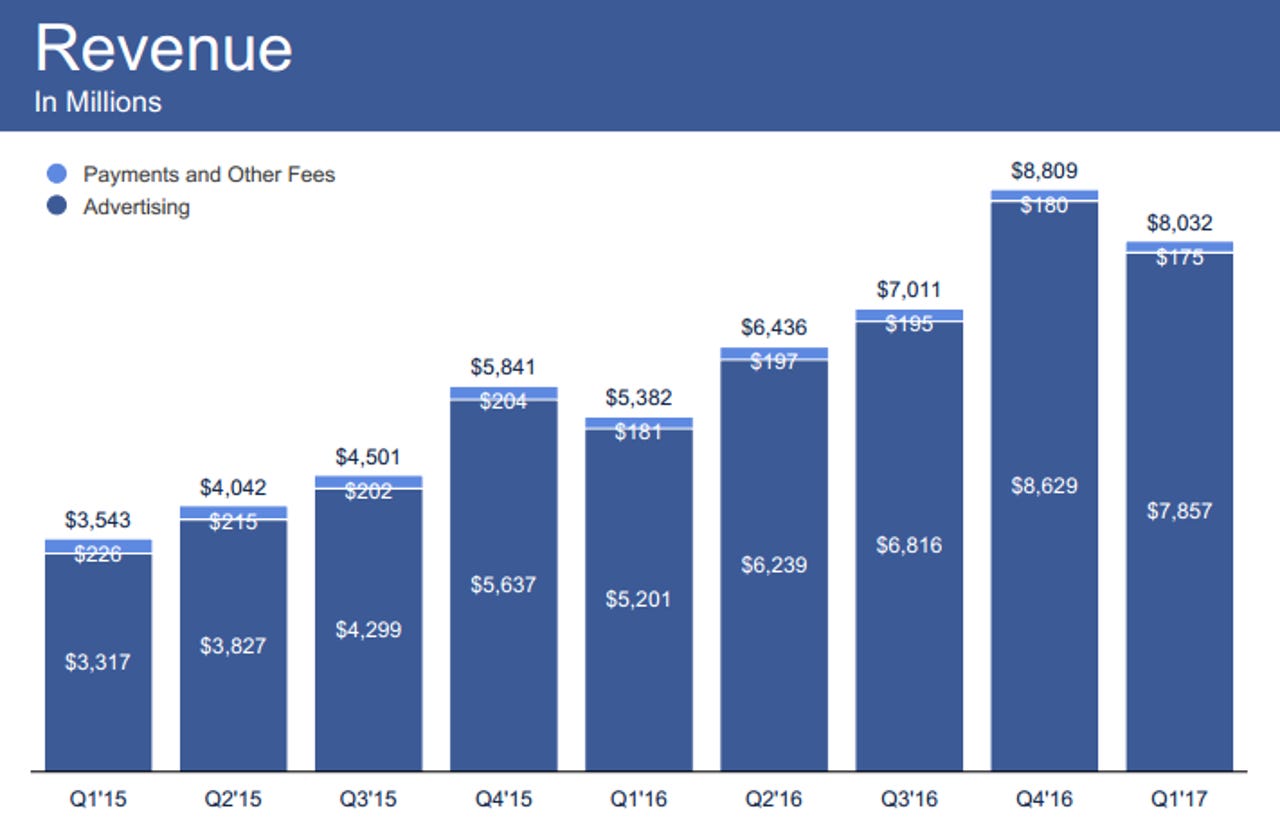Facebook beats Q1 revenue expectations as monthly user base nears 2B

Facebook published its first quarter financial results on Wednesday, beating market expectations.
The social media giant posted diluted earnings per share of $1.04 on revenue of $8.03 billion. Its diluted EPS is up 73 percent year-over-year, while revenue is up 49 percent.

Wall Street was looking for a GAAP EPS of 887 cents on revenue of $7.83 billion.
Facebook announced it's is no longer reporting non-GAAP expenses, income, tax rate, and earnings per share (EPS).
"We had a good start to 2017," founder and CEO Mark Zuckerberg said in a statement. "We're continuing to build tools to support a strong global community."
Specifically, advertising revenue came in at $7.85 billion, up 51 percent year-over-year. About 85 percent of ad revenue came from mobile in Q1, up from 82 percent in Q1 2016.
While year-over-year growth is still strong, CFO David Wehner said on a Wednesday conference call that Facebook continues "to expect that our ad revenue growth rates will come down meaningfully over the course of 2017."
Specifically, they expect that ad load will play a less significant factor in driving revenue growth after mid-2017, and that desktop ad revenue growth rates will slow in the third quarter.
The company also reported strong year-over-year growth in terms of its active users: It tallied an average of 1.28 billion daily active users in March 2017, up 18 percent. Monthly active users were up 17 percent to reach an average of 1.94 billion by March 31.
Last month, Facebook announced that Messenger has 1.2 billion monthly active users, while Instagram said it has 700 million monthly active users.
The company has continued to draw in new users and keep them active in part by adopting features initially rolled out by their competitor Snapchat. For instance, Facebook, Instagram, WhatsApp and Messenger all now have a "stories" feature.
On a conference call Wednesday, Zuckerberg said that stories on Messenger already has 175 million daily active users -- just a couple months after launch -- while Instagram stories has more than 200 million. Facebook also recently rolled out Messenger Day and Facebook Stories, and "we're going to keep putting video at the center of all these services," Zuckerberg said.
"Over the next 5 years, we're going to build ecosystems around our products that a lot of people are already using," he added, putting Live Video in that category. Over the past year, daily watch time for Facebook Live broadcasts has grown by more than four times, he said.
Facebook Live has had its share of controversy. Earlier in the day, Zuckerberg announced the company is hiring 3,000 more people over the next year to monitor incoming reports of inappropriate content on the site -- such as violence, hate speech or child exploitation. All told, Facebook will have 7,500 people around the globe to monitor the millions of reports it gets each week.
Zuckerberg said on Wednesday's call that artificial intelligence will eventually be able to do a better job of flagging inappriopriate content, so it can be reviewee by a person. However, he said it will be "a period of years to reach the quality level we want" when it comes to those AI tools.
In another controversy, a female Facebook employee recently gathered data to show that code written by women was rejected more frequently than code written by men in the comany. As the Wall Street Journal reports, Facebooks' head of infrastructure reviewed the data and suggested the discrepancy had more to do with an engineer's rank than their gender. Women account for just 17 percent of technical roles at Facebook.
COO Sheryl Sandberg said on Wednesday's call that she takes the issue "very seriously." Facebook conduct regular, comprehensive reviews of its promotion and pay review processes, and "we know we're promoting women at the same rate as men," she said.
Sandberg suggested there were systemic issues at play. "We don't have enough women going into computer science," she said.